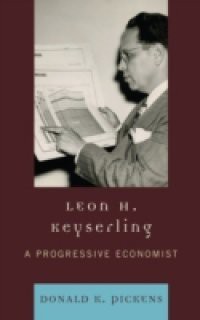Leon H. Keyserling: A Progressive Economist is the insightful biography of the life and thought of the influential liberal reformer Leon H. Keyserling. By examining Keyserling's life in the context of integrative liberalism, the biography aims to explore the origins of the concept of integrative liberalism and Keyserling's profound and provocative contribution to it. The book follows the political reformer's life from the beginning of his career as a member of Democratic Senator Robert Wagner's staff, at the same time showing how the Progressive Movement, before World War I, was the ideological and institutional origin for integrative liberalism. The Great Depression and subsequent New Deal, to which Keyserling was a significant contributor, allowed integrative liberalism to develop until the movement started losing vitality in the 1960's and came to an end during the Reagan Presidency. In the meantime, the book presents Keyserling as a major sculptor of Truman's economic policies, after which he left the government and began effectively debating public policy on his own. Tracing Keyserling's interactions with each presidency, the biography shows that Keyserling's policies and politics were expressive of integrated liberalism, an often-overlooked philosophy of reform in the second half of the twentieth century. The ideological cornerstone of integrative liberalism was a full employment public policy, expressed as economic growth and developed directly from United States history. The fear driving the policy was that there would be wide swings in the business cycle, resulting in underemployment and economic stagnation. This sentiment and fear has an impact even now in the twenty-first century, making Leon H. Keyserling a timely and profitable study for graduate and undergraduate students of history, economics, political science, and public administration.

